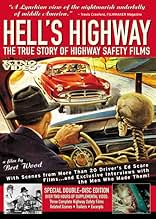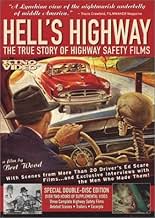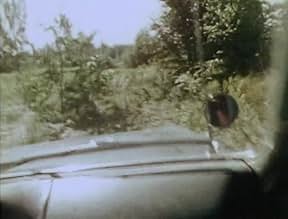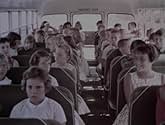IMDb RATING
6.9/10
233
YOUR RATING
The history of traffic safety educational films and their notoriously lurid content.The history of traffic safety educational films and their notoriously lurid content.The history of traffic safety educational films and their notoriously lurid content.
Richard Anderson
- Self - Husband
- (archive footage)
Sonny Bono
- Self
- (archive footage)
Hans Conried
- Self
- (archive footage)
Earle Deems
- Self
- (as Earle J. Deems)
Ronald Reagan
- Self
- (archive footage)
Robert F. Simon
- Self - Rellik
- (archive footage)
James Stewart
- Self - Narrator
- (archive footage)
Dick York
- Self - Nick
- (archive footage)
- Director
- Writer
- All cast & crew
- Production, box office & more at IMDbPro
6.9233
1
2
3
4
5
6
7
8
9
10
Featured reviews
Great to Bring this Genre to the Forefront
A great idea,but a rather shaky production.Great interviews with members of the Foundation,and video archivists.They missed the chance to possibly interview those who appeared in the films (as victims) and those who recreated scenes in their films (like Wheels of Tragedy).But overall,thank goodness this genre has been given a new voice.Kids today laugh at death and blood.Society has felt it better to shield kids from the reality of death and agony rather than shock them/damage them,with the truth.Death isn't pretty,but its reality.Many thousands die every year,and millions are injured....what better subject to showcase than the fact that car crashes kill and maim American lives.For those who feel that sacraficing even one soldier in Iraq or Afganistan is wrong,just stop and think....how many Americans die in just ONE day on our roads? And nothing our "mighty" SUVs,pickups,semis,muscle cars or exotic imports can prevent.People die in EVERY vehicle,in every state and in every town.And over time,in every street.Think about that next time you tool around town talking on the cell phone or adjusting your radio knob.Take the advice these films were meant to give...think,use your head,and fear for your life.You will be a much safer driver as a result.
Overlong look at the legendary Driver's Ed crash films
This is a 90 minute documentary about the Highway Safety Institutes Driver's Ed shock films. Its a graphic trip down memory lane to a time and place that many of us never experienced and only heard about.
Hell's Highway is the story of the company that produced educational films for schools and institutions from the late 1950's until the 1980's. The Highway Safety Institute was borne of the idea that if people saw the horrors of traffic accidents they would drive more carefully. The film makers went out and filmed the aftermath of terrible accidents where the broke bodies were removed from the wreck cars for years. The film they shot ended up in dozens of films that grossed out generations of school kids.
This documentary is an interesting look at the people who went out and filmed the carnage. We get interviews with the film makers, police, and people who saw the films in addition to clips from the films themselves. Its a visceral experience that leaves you feeling a bit uneasy. Several clips are more shocking in the documentary than they probably are in the source films because you get the stories behind the footage which makes them more heartbreaking and gruesome.
The film however suffers from over length. Running some 90 minutes the film begins to feel pointless about half way in, as the film makers seem intent of telling you everything about the company that made these films (including rumors of porn films). Its not bad, its simply that after a while the interest begins to wane as the film goes into all of the other films that the company made. While not fatal I did find that I was stopping the film to do other things simply because I was losing interest.
If you are interested in seeing a rapidly disappearing slice of Americana I recommend you take the time and see this film. Its an informative (if gory) look into the past. Also if you saw any of these films as a teenager this is the perfect way of re-seeing the movies that probably haunted your nightmares for weeks afterward.
(And if you're really interested get your hands on the DVD which comes with a second disc with four or five complete films and clips from probably two dozen more)
Hell's Highway is the story of the company that produced educational films for schools and institutions from the late 1950's until the 1980's. The Highway Safety Institute was borne of the idea that if people saw the horrors of traffic accidents they would drive more carefully. The film makers went out and filmed the aftermath of terrible accidents where the broke bodies were removed from the wreck cars for years. The film they shot ended up in dozens of films that grossed out generations of school kids.
This documentary is an interesting look at the people who went out and filmed the carnage. We get interviews with the film makers, police, and people who saw the films in addition to clips from the films themselves. Its a visceral experience that leaves you feeling a bit uneasy. Several clips are more shocking in the documentary than they probably are in the source films because you get the stories behind the footage which makes them more heartbreaking and gruesome.
The film however suffers from over length. Running some 90 minutes the film begins to feel pointless about half way in, as the film makers seem intent of telling you everything about the company that made these films (including rumors of porn films). Its not bad, its simply that after a while the interest begins to wane as the film goes into all of the other films that the company made. While not fatal I did find that I was stopping the film to do other things simply because I was losing interest.
If you are interested in seeing a rapidly disappearing slice of Americana I recommend you take the time and see this film. Its an informative (if gory) look into the past. Also if you saw any of these films as a teenager this is the perfect way of re-seeing the movies that probably haunted your nightmares for weeks afterward.
(And if you're really interested get your hands on the DVD which comes with a second disc with four or five complete films and clips from probably two dozen more)
Great topic, bad angle
I was shown one of these scare films in the mid-80s and believe they are enormously effective. This documentary is about a fascinating topic, but it's point of view promotes the idea that the films don't work. I could not disagree more. After seeing the real result of speeding, or going through a stop sign in one of these films in a high school driver's ed class I drove MUCH more carefully as a teenager. Those bloody corpses smashed into the windshield are so disgusting I believe I'm still the cautious driver I am today because of them. THE TACTIC WORKS. We live in an era when corporate media and the government believe the public is too queasy to see our war dead from Iraq. And those are just coffins! The more informed we are about the real consequences of our actions the better off we are.
"Stimulate! Motivate! Educate!"...
HELL'S HIGHWAY is a documentary about those educational / safety films that flickered in many a darkened classroom of yesteryear. The best of these films were the "Driver's Ed." movies. Hyper-dramatic, preachy, and, in retrospect, extremely entertaining, these moralistic tales are very watchable today.
The concept of "Teenicide": the idea that teens are just an accident waiting to happen, is as hilarious today as it was serious way back when.
The switch from the early, choreographed films to those containing actual car accident footage is chronicled. The shocking images are discussed, as well as their impact and the reasoning behind them. The ghoulish nature of the films, the filmmakers, and those creepy narrators are also examined.
Though the movies themselves were / are exploitative and manipulative, this documentary is quite informative. It even explores the Highway Safety Foundation, its alleged connections to pornography, and a murder mystery involving one of its photographers!
In addition, there's an interesting segment featuring none other than Jimmy Hoffa!
Plus, the company's most controversial films about homosexual encounters and child molestation, the latter of which traumatized many an elementary school student!
An educational, entertaining investigation into these short films...
The concept of "Teenicide": the idea that teens are just an accident waiting to happen, is as hilarious today as it was serious way back when.
The switch from the early, choreographed films to those containing actual car accident footage is chronicled. The shocking images are discussed, as well as their impact and the reasoning behind them. The ghoulish nature of the films, the filmmakers, and those creepy narrators are also examined.
Though the movies themselves were / are exploitative and manipulative, this documentary is quite informative. It even explores the Highway Safety Foundation, its alleged connections to pornography, and a murder mystery involving one of its photographers!
In addition, there's an interesting segment featuring none other than Jimmy Hoffa!
Plus, the company's most controversial films about homosexual encounters and child molestation, the latter of which traumatized many an elementary school student!
An educational, entertaining investigation into these short films...
Wake Up Calls are Long Distance
There's nothing cliché, or square, when it comes to waking people up. If you tell a teenager "DON'T Do IT", they probably will for the thrill of it. More people have died each year of car accidents than pandemics. So the idea of speaking to young or old driver's is preachy, and a waste of time is naïve. The automobile has been around since the early 1900's and the 1950's blossomed stupid "rebel without a cause" spoiled teenager movies, like Brando, the wild one. Something was desperately needed to SCARE the Hell out of people in general from driving like jackasses. These films like Signal 30, or blood on the highway was what was needed at the time. People today are just as stupid driving while texting. Its no better today, just more air-bags to combat the air-heads behind the wheel.
Did you know
- ConnectionsFeatures The Story of Life (1948)
- SoundtracksPolarity
Performed by Alan Licht
Details
Box office
- Gross US & Canada
- $2,171
- Opening weekend US & Canada
- $1,225
- Jun 29, 2003
- Gross worldwide
- $2,171
- Runtime
- 1h 31m(91 min)
- Color
- Sound mix
- Aspect ratio
- 1.37 : 1
Contribute to this page
Suggest an edit or add missing content






















